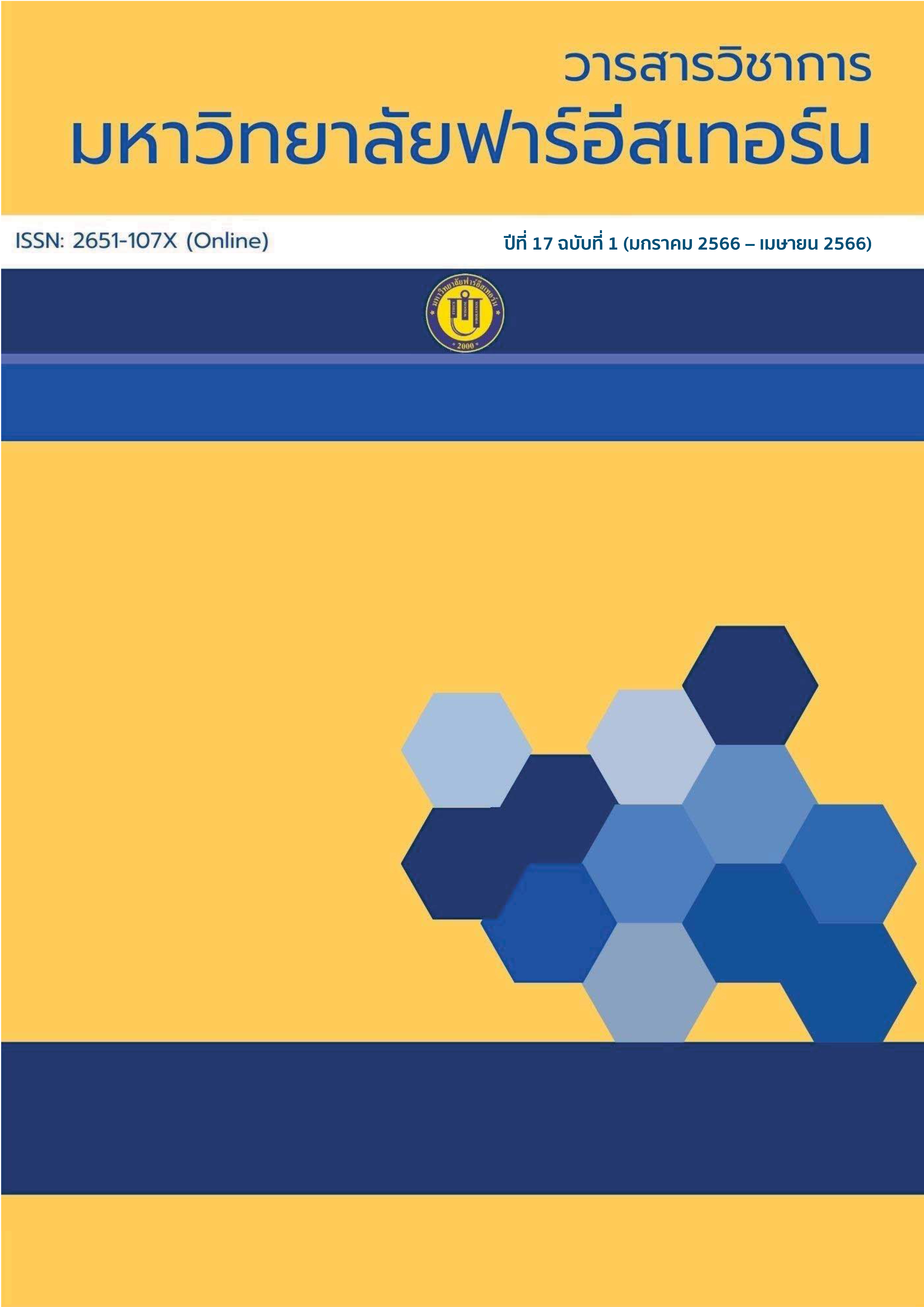ความคิดเห็นของนักศึกษาต่อรายวิชาในหลักสูตรวิชาการประถมศึกษา มหาวิทยาลัยฟาร์อีสเทอร์น
Main Article Content
บทคัดย่อ
การวิจัยในครั้งนี้ มีวัตถุประสงค์ของการวิจัยเพื่อ 1) เพื่อศึกษาความคิดเห็นของนักศึกษาในการนำความรู้รายวิชาในหลักสูตรวิชาการประถมศึกษา มหาวิทยาลัยฟาร์อีสเทอร์น ไปประยุกต์ใช้ 2) เพื่อศึกษาความคิดเห็นของนักศึกษาต่อความเหมาะสมของจำนวนรายวิชาและจำนวนหน่วยกิตรายวิชาในหลักสูตรวิชาการประถมศึกษา มหาวิทยาลัยฟาร์อีสเทอร์น 3) เพื่อศึกษาข้อเสนอแนะของนักศึกษาต่อรายวิชาหรือเนื้อหาที่ต้องการศึกษาในหลักสูตรการประถมศึกษามหาวิทยาลัยฟาร์อีสเทอร์น เพื่อการจัดการเรียนการสอน โดยทำการเก็บข้อมูลจากนักศึกษาศิษย์เก่าและศิษย์ปัจจุบัน สาขาวิชาการประถมศึกษา มหาวิทยาลัยฟาร์อีสเทอร์น รุ่นที่ 1 – 5 จำนวน 71 คน เครื่องมือที่ใช้ในการวิจัยคือแบบสอบถามความคิดเห็นสำหรับนักศึกษาศิษย์เก่าและศิษย์ปัจจุบัน สาขาวิชาการประถมศึกษา แบ่งออกเป็น 3 ตอน คือ 1) การนำความรู้รายวิชาในหลักสูตร วิชาการประถมศึกษา มหาวิทยาลัยฟาร์อีสเทอร์น ไปประยุกต์ใช้ 2) ความเหมาะสมของจำนวนรายวิชาและจำนวนหน่วยกิตรายวิชาในหลักสูตรวิชาการประถมศึกษา มหาวิทยาลัยฟาร์อีสเทอร์น 3) ข้อเสนอแนะของนักศึกษาต่อรายวิชาหรือเนื้อหาที่ต้องการศึกษาในหลักสูตรวิชาการประถมศึกษา มหาวิทยาลัยฟาร์อีสเทอร์น เพื่อการจัดการเรียนการสอน ผลการวิจัยพบว่า รายวิชาที่สามารถนำไปประยุกต์ใช้ได้จริงมากที่สุด 3 รายวิชา (กลุ่มวิชาชีพ) ได้แก่ อันดับ 1 วิชาการจัดการเรียนรู้และการจัดการชั้นเรียน อันดับ 2 วิชานวัตกรรมและเทคโนโลยีสารสนเทศทางการศึกษา อันดับ 3 การวัดผลและประเมินผลการเรียนรู้ รายวิชาที่เคยเรียนและสามารถนำไปประยุกต์ใช้ได้จริงมากที่สุด 3 รายวิชา (กลุ่มวิชาเอกบังคับ) ได้แก่ อันดับ 1 วิชาบูรณาการและการสอนแบบบูรณาการ อันดับ 2 วิชาพัฒนาการและการเรียนรู้ของนักเรียนระดับประถมศึกษา อันดับ 3 วิชาประสบการณ์การเรียนรู้สำหรับนักเรียนประถมศึกษา นักศึกษามีความพึงพอใจจำนวนรายวิชาต่อจำนวนหน่วยกิตมีความเหมาะสม ร้อยละ 73.08 และนักศึกษามีความพึงพอใจจำนวนรายวิชาต่อจำนวนหน่วยกิตมากเกินไป คิดเป็นร้อยละ 26.92 และข้อเสนอแนะด้านรายวิชาที่อยากให้มีการจัดการเรียนการสอน ดังนี้ การสอนเขียนกระดาน ทักษะการใช้คอมพิวเตอร์ การใช้เทคโนโลยีในการจัดการเรียนการสอนออนไลน์ในระดับประถมศึกษาและการสอนสนทนาภาษาอังกฤษ มีข้อเสนอแนะในการปรับปรุงพัฒนาหลักสูตรว่าควรพัฒนาหลักสูตรให้สอดคล้องกับยุคสมัยที่มีการเปลี่ยนแปลงในปัจจุบัน
Article Details

อนุญาตภายใต้เงื่อนไข Creative Commons Attribution-NonCommercial-NoDerivatives 4.0 International License.
1. ทัศนะและข้อคิดเห็นใดๆ ในวารสารนวัตกรรมสังคมและการเรียนรู้ตลอดชีวิตเป็นทัศนะของผู้เขียน กองบรรณาธิการไม่จำเป็นต้องเห็นพ้องด้วยกับทัศนะเหล่านั้นและไม่ถือว่าเป็นความรับผิดชอบของกองบรรณาธิการ
2. ความรับผิดชอบด้านเนื้อหาและการตรวจร่างบทความแต่ละบทเป็นของผู้เขียนแต่ละท่าน กรณีมีการฟ้องร้องเรื่องการละเมิดลิขสิทธิ์ถือเป็นความรับผิดชอบของผู้เขียนแต่เพียงฝ่ายเดียว
3. ลิขสิทธิ์บทความเป็นของผู้เขียนและมหาวิทยาลัยฟาร์อีสเทอร์นได้รับการสงวนสิทธิ์ตามกฎหมาย การตีพิมพ์ซ้ำต้องได้รับอนุญาตโดยตรงจากผู้เขียนและมหาวิทยาลัยฟาร์อีสเทอร์นเป็นลายลักษณ์อักษร
เอกสารอ้างอิง
กระทรวงศึกษาธิการ. (2560). แนวทางการดำเนินงานโครงการสถานศึกษาน้อมนาศาสตร์พระราชา สู่การพัฒนาอย่างยั่งยืน. กรุงเทพฯ: สำนักส่งเสริมกิจการศึกษา.
กิดานันท์ มลิทอง. (2548). เทคโนโลยีและการสื่อสารเพื่อการศึกษา. กรุงเทพฯ: อรุณการพิมพ์.
ธำรง บัวศรี. (2542). ทฤษฎีหลักสูตร: การออกแบบหลักสูตรและพัฒนา. กรุงเทพฯ: ธยรัช.
ปรียาพร วงศ์อนุตรโรจน์. (2543). การบริหารงานวิชาการ. กรุงเทพฯ: ศูนย์สื่อเสริมกรุงเทพ.
มารุต พัฒผล. (2562). รูปแบบการพัฒนาหลักสูตรร่วมสมัย. กรุงเทพฯ: ผู้นำนวัตกรรมหลักสูตรและการเรียนรู้. http://www.curriculumandlearning.com/upload/Books/รูปแบบการพัฒนาหลักสูตรร่วมสมัย_1544713884.pdf
ยุภาวดี พรมเสถียร และ ธีรชัย เนตรถนอมศักดิ์. (2564). เทคโนโลยีสารสนเทศช่วยพัฒนาการเรียนการสอนได้จริงหรือ?. วารสารมหาวิทยาลัยราชภัฏมหาสารคาม, 15(3), 1-13. https://so05.tci-thaijo.org/index.php/rmuj/article/view/256210
ราชบัณฑิตยสถาน. (2546). พจนานุกรมสังคมวิทยา อังกฤษ-ไทย. กรุงเทพฯ: นานมีบุ๊ค พับลิเคชั่น.
วิชัย วงษ์ใหญ่. (2552). “หลักสูตร”. สารานุกรมวิชาชีพครู เฉลิมพระเกียรติ พระบาทสมเด็จพระเจ้าอยู่หัว เนื่องในโอกาส มหามงคลเฉลิมพระชนมพรรษา 80 พรรษา. กรุงเทพฯ: สำนักงานเลขาธิการคุรุสภา.
วิลาพัณย์ อุรบุญนวลชาติ และ อรพิณ ศิริสัมพันธ์. (2562). การพัฒนาหลักสูตรเพื่อเสริมสมรรถนะการจัดการเรียนรู้สำหรับนักศึกษาครูประถมศึกษา เพื่อพัฒนาคุณลักษณะความเป็นพลเมืองของนักเรียนระดับประถมศึกษา. วารสารศิลปากรศึกษาศาสตร์วิจัย, 11(2), 306-323.
สมชาย รัตนทองคำ. (2554). เอกสารประกอบการสอน 475 788 การสอนทางกายภาพบําบัด ภาคต้นปี-การศึกษา 2554. กรุงเทพฯ: มหาวิทยาลัยเกษตรศาสตร์.
สำนักงานคณะกรรมการพัฒนาการเศรษฐกิจและสังคมแห่งชาติ. (2560). แผนพัฒนาเศรษฐกิจและสังคม แห่งชาติ ฉบับที่ 12 (พ.ศ.2560-2564). กรุงเทพฯ: สำนักนายกรัฐมนตรี. https://www.nesdc.go.th/ewt_news.php?nid=6420&filename=develop_issue
สิริพัชร์ เจษฎาวิโรจน์. (2546). การจัดการเรียนการสอนแบบบูรณาการ. กรุงเทพฯ: บุ๊ค พอยท์.
สุมาลี ประทุมมา. (2554). ความคิดเห็นต่อการเรียนรู้สาระพลศึกษา ตามหลักสูตรการศึกษาข้นพื้นฐาน พุทธศักราช 2544 ของนักเรียนช่วงชั้นที่ 3 โรงเรียนสาธิต สังกัดสำนักงานคณะกรรมการการอุดมศึกษา กรุงเทพมหานคร และโรงเรียนสังกัดเขตพื้นทีการศึกษาการุงเทพมหานคร เขต 1 ปีการศึกษา 2553 [วิทยานิพนธ์ปริญญามหาบัณฑิต, มหาวิทยาลัยศรีนครินทรวิโรฒ].
อุปริฏฐา อินทรสาด และ นัสมล บุตรวิเศษ. (2564). การศึกษาความคิดเห็นของนักเรียนระดับชั้นมัธยมศึกษาตอนปลายที่มีต่อการจัดการสถานศึกษาของโรงเรียน สำนักงานเขตพื้นที่การศึกษามัธยมศึกษา จังหวัดพระนครศรีอยุธยา (รายงานการวิจัย). พระนครศรีอยุธยา: มหาวิทยาลัยเทคโนโลยีราชมงคลสุวรรณภูมิ.

